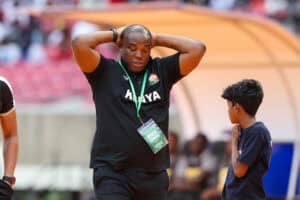When I woke up on Monday morning and read the news that Cape Town City had sacked Benni McCarthy, there was one element of the statement from the Cape club that struck me as a refreshing break from the norm when coaches are given their marching orders.

This is, simply, that City admitted they had fired their man.
“Cape Town City Football Club has terminated the employment of coach Benni McCarthy with immediate effect, following a run of performance that saw the club win 2 of the last 18 games,” read the statement. Whatever you think about the merits of the decision, the acknowledgement that he was fired is a welcome respite from this “parted ways by mutual agreement” nonsense too often spouted by teams who want to put a nice warm lyrical blanket over what has actually occurred.
McCarthy did a fine job for much of his time at City, carrying on the fine work started by Eric Tinkler, as the Cape side made a real mark in the Premier Soccer League almost from the moment they came into existence, when John Comitis purchased the status of Mpumalanga Black Aces.
City finished third under Tinkler in the 2016/17 season, and won the 2016 Telkom Knockout, while they finished fifth under McCarthy when he took over once Tinkler left for an ultimately ill-fated stint at SuperSport, and fourth in the 2018/19 season, while McCarthy also won a trophy, in the form of the 2018 MTN8.
The former Ajax Amsterdam, FC Porto, Blackburn Rovers and Bafana Bafana striker – his country’s all-time leading goalscorer – did not cut any corners en route to coaching either, earning his badges in Europe, and serving a stint as an assistant coach in Belgium, before he took up the City job.
McCarthy seemed the perfect fit for a young, exciting City side, and built a team that played an enterprising style of football, but that could also be pragmatic.
Teko Modise thrived in the twilight of his career at City under McCarthy, Ayanda Patosi also had a spell where he sizzled, before moving back overseas, while Thabo Nodada emerged as an immensely talented midfielder, and Thami Mkhize nailed down his place as Bafana Bafana’s No 1 rightback.
McCarthy could be abrasive, publicly chastising his players post-match, but while he was successful, this didn’t seem to matter too much. Fast forward to this season, however, and it all began to unravel rather quickly. The side’s defence of their MTN8 title ended in the first round against Polokwane City, and they won just won of their opening nine league games, also going out of the Telkom Knockout on penalties at the hands of Kaizer Chiefs.
McCarthy’s post-match interviews were typically fiery, at one point talking about going into the dressing-room and punching his players, at another saying the referee in a Chiefs game “might as well have just put on a Kaizer Chiefs shirt,” a comment that he has been asked to explain by the PSL.
This time, however, McCarthy’s off-field antics were not matched by on-field results, and a strained relationship between McCarthy and club owner Comitis this week reached its end. McCarthy was also reportedly not happy with the signings City had made, particularly with the failure to bring experienced defender Robyn Johannes back to the club.
One hopes he learns from this and continues as a head coach, preferably in the Absa Premiership, where his personality will be sorely missed.
For more news your way, download The Citizen’s app for iOS and Android.
Support Local Journalism
Add The Citizen as a Preferred Source on Google and follow us on Google News to see more of our trusted reporting in Google News and Top Stories.






